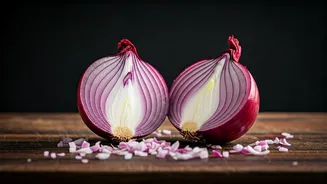Onion Varieties Unveiled
Onions, a fundamental element in kitchens globally, come in numerous varieties, each possessing unique characteristics. Within the Indian culinary landscape,
desi and red onions hold significant importance. Desi onions, often characterized by their pungent flavor and yellowish-brown skin, are a traditional staple in Indian cooking. Conversely, red onions, identifiable by their vibrant reddish-purple skin and milder taste, offer a versatile option for salads, garnishes, and various dishes. Both onion types contribute distinct flavors and textures to meals, making them essential ingredients in the diverse Indian cuisine. Understanding the differences between these two kinds of onions aids in making informed decisions about their application in your cooking practices.
Health Benefits Explored
Both desi and red onions are loaded with health benefits owing to their nutritional composition. Onions are rich sources of antioxidants that fight cell damage and prevent several chronic diseases. Desi onions, with their strong flavor, contain high levels of sulfur compounds, which have been associated with anti-inflammatory properties. Red onions, on the other hand, are rich in quercetin, an antioxidant known for its ability to reduce inflammation and boost overall health. Regular consumption of either onion type can contribute significantly to overall well-being. By incorporating them into your diet, you're not just adding flavor but also supporting your body's natural defenses against illness and disease. Their consumption can lead to a healthier lifestyle.
Culinary Applications Detailed
The application of desi and red onions in cooking diverges based on their flavor profiles. Desi onions, owing to their robust and sharp taste, are ideally suited for base preparations in curries, stews, and sautéed dishes. Their intense flavor enhances the overall taste profile, which forms the core of many Indian recipes. Red onions, with their relatively mild flavor and vibrant color, are well-suited for raw applications such as salads, sandwiches, and as garnishes. Their crisp texture and slightly sweet taste provide a refreshing contrast to other ingredients. In cooking, red onions are frequently used in pickling or grilling, which mellows their flavor and makes them an excellent addition to various dishes. Understanding these culinary distinctions will assist in optimizing the use of each onion type for different recipes.
Reducing Inflammation Naturally
Both desi and red onions possess properties that can aid in reducing inflammation, a core component of many chronic health issues. Desi onions are rich in sulfur compounds, particularly allicin, which converts into substances that exhibit anti-inflammatory characteristics. These compounds help to inhibit the inflammatory pathways within the body. Red onions contain quercetin, a flavonoid that helps combat inflammation. Quercetin acts as an antioxidant, neutralizing free radicals and lowering the risk of cell damage. Consuming these onions regularly can provide a natural way to reduce inflammation and maintain overall health. They can be included in your everyday diet to leverage their natural anti-inflammatory benefits.
Optimal Onion Preparation
To maximize the health benefits and culinary potential of desi and red onions, proper preparation is key. Before cooking, ensure the onions are peeled and any damaged parts are removed. For raw consumption, thinly slicing or dicing red onions can help release their flavors without overwhelming the dish. When cooking, sauteing or caramelizing onions at a low temperature can bring out their natural sweetness and soften their texture. For desi onions, cooking them thoroughly will mellow their strong flavors. To retain the maximum amount of nutrients, consider minimal cooking methods such as steaming or grilling. Each preparation style highlights distinct aspects of the onions, which contribute to a diversity of flavor profiles in your cooking.
Choosing the Best Onion
The best onion for you hinges on your cooking requirements and individual health goals. If you need a strong flavor base for a curry or stew, desi onions are the appropriate choice. Their robust taste adds depth to traditional Indian recipes. For raw applications and a milder flavor, red onions are the better option. Consider your health needs, too. If reducing inflammation is a key priority, both options offer benefits. Red onions with their quercetin content, and desi onions with their sulfur compounds, provide valuable assistance. Making the right choice involves understanding your flavor preferences and health goals to determine which onion variety would be optimal for your needs.

















